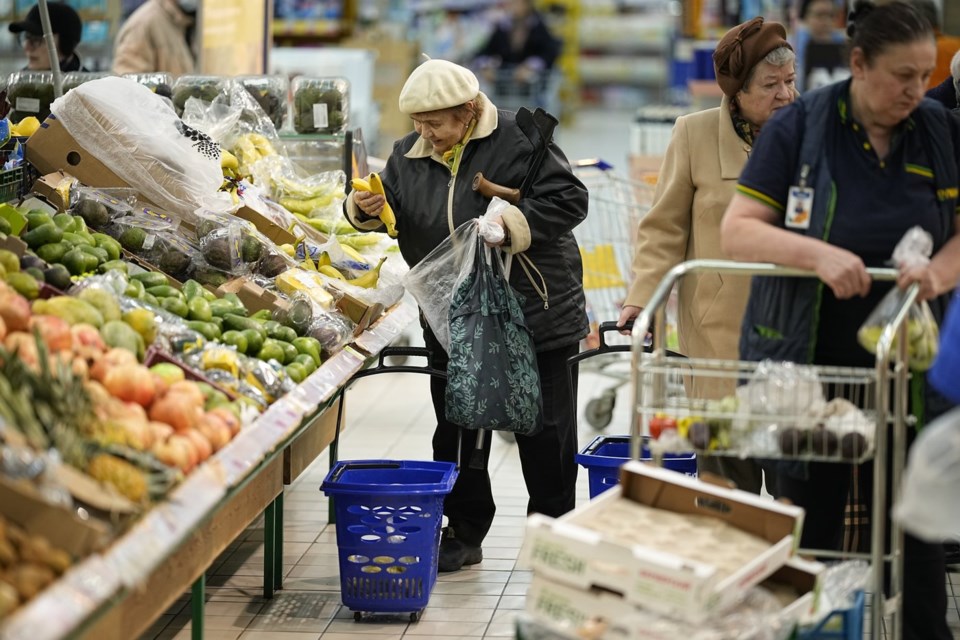MOSCOW (AP) — Russia's central bank hiked interest rates to their highest since the Kremlin sent troops into Ukraine more than 2 1/2 years ago, a step aimed at combatting the inflation fuelled by massive government outlays for the military — and by robust spending from Russian consumers in shops.
The bank raised its key rate to 19%, just below the level from late February 2022. Then the policy rate reached an unprecedented 20% in a desperate bid by the bank to shore up the ruble and ward off a financial collapse amid sanctions imposed by Western governments.
Today's situation is different: inflation is a sign of an economy overheating from government outlays and consumer demand that are outpacing the economy's capacity to produce goods and services.
Muscovites shopping Thursday on Bolshaya Dorogomilovskaya Street in western Moscow were well aware of the pace of price increases.
“I wish wages would grow as much as prices in stores," said Natalya, who like others declined to give a last name. "Everything is expensive. Eggs, bread, flour, sugar, salt, everything is expensive.”
Andrei said that “half of the salary goes on food alone. And if you take into account that 70 percent of ordinary people have a mortgage and large consumer loans in the form of car loans and so on, so the people, one could say, are starving.”
“What to do?" said Irina. "I do not know what to do, it is not my business to decide what to do. They need to stop the prices increase and, perhaps, stop some political actions that entail inflation.”
Factories are running at full speed to produce goods including clothing and vehicles for the military. As a result, many workers are seeing rising pay and consumer demand has been robust, adding more fuel to the inflation fire.
Despite sanctions and shoppers disgruntled over their grocery bills, Russia's economy remains in solid shape in many ways. The economy grew 4.4% in the second quarter. The ruble has been stable recently, after losing some 40% of its value against the dollar and the euro since 2022. Government finances, boosted by oil exports, are in good shape despite increased spending, with modest deficits easily covered by borrowing from Russian banks.
Over the longer term, inflation, loss of foreign markets and foreign investments because of sanctions can mean lower growth and income.
And there's a risk that high borrowing costs will hurt Russian companies and growth in the coming months.
Central bank head Elvira Nabiullina said however that more rate hikes could be forthcoming to return inflation from the current 9.1% to the bank's target of 4% in 2025.
“We feel this is achievable next year and we are pursuing the policy to make that happen,” Nabiullina said at a news conference following the rate decision. “We are ready to maintain tight monetary conditions for as long as needed, we are also ready to raise the key rate further.”
She cited the corrosive effects of too-high inflation, including the erosion of people's savings, high borrowing rates on longer-term loans and mortgages, and the risk of inflationary expectations becoming entrenched in wages and prices.
Higher interest rates make it more expensive to borrow and spend on goods, in theory relieving pressure on prices. Higher interest on savings can also convince people to set their disposable income aside rather than splurge. So far the central bank has been fighting a losing battle, and economists say that at some point tight credit may slow growth.
Rising wages and a strong jobs market have helped shoppers compensate for inflation and as a result “consumer activity remains high,” the central bank said.
“The reason they have raised the rate is because they want to cool what is a very fast growing consumer market," said Chris Weafer, CEO at Macro-Advisory Ltd. consultancy. "And their fear is that unless they can slow down the consumer market, then that will lead to a bubble which will then burst and leave the economy in a much worse situation."
Government revenues are supported by economic growth and by continuing exports of oil and gas with less than airtight sanctions and a $60 price cap imposed by Western governments on Russian oil. The cap is enforced by barring Western insurers and shippers from handling oil priced over the cap. But Russia has been able to evade the price cap by lining up its own fleet of tankers without Western insurance and earned some $17 billion in oil revenues in July.
The Associated Press



